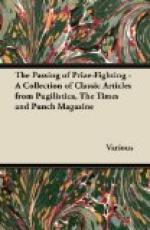A memorandum on the economics of the Russian Ballet and the probable cost of its reorganisation on a Marxian basis was read by Mr. Ploffskin of the Garden City Gymnosophist Guild. By a scheme for a uniform salary for all dancers, compulsory vegetarian diet, and the exclusive use of the balalaika, Mr. Ploffskin was of opinion that a Bolshevist Ballet might be safely organised so as to satisfy the artistic aspirations of the proletariat and counteract the pernicious influences of the pseudo-Ethiopian style affected by the idle rich.
Examined by Sir Edwin Edgar, O.M., Mr. Ploffskin admitted that none of the famous Russian composers of recent years had associated themselves with the Revolutionary movement, and that the Russian Ballet had originally been an integral part of the Imperial Opera. But he had no doubt that on a proper proletarian basis it would function with a far more beneficent activity. He pointed out that there was a strong facial resemblance between TROTSKY and M. PADEREWSKI, and between LENIN and BEETHOVEN. In reply to a question from Mr. Moody MacTear, Mr. Ploffskin said that he had been down a coal-mine in Siberia.
Sir Mark Holloway, who next occupied the witness’s chair, admitted, in reply to the questions of Sir Gladney Jebb, that, since his student days, he had seldom been engaged in manual labour on any instrument for more than two hours a day. It was not necessary for a conductor. But he knew of pianists who practised for six or even eight hours a day with impunity.
Sir Gladney Jebb. Do you not think that if all compositions were written in the key of C it would materially conduce to the greatest happiness of the greatest number?—The President has already deprecated the multiplication of hypothetical questions, which have reached a total of more than fifteen thousand.
Viscount Vermicelli. Do you think that the unrestrained performance of Jazz-music conduces to the moral betterment of the simian proletariat?—That seems to me to be a question which bears on the administration of the Unnecessary Noises Act.
Are you in favour of the establishment of a Ministry for the Control of Syncopation?—No; but I would cordially support a Bill for the Compulsory Segregation of Irresponsible Collectivists.
In reply to Mr. Moody MacTear, Sir Mark Holloway said that he had never been down a coal-mine, but that he had a few shares in a gold-mine, which had cost him five pounds a-piece, but had never borne any dividends and were now quoted at one-and-sixpence.
The next witness, Dame Frisca, the famous Californian singer, was subjected to a remarkably severe examination by Mr. Moody MacTear.
Mr. Moody MacTear. Do you consider that the assumption of the title prima donna is compatible with democratic principles?—I never assumed it; it was bestowed on me by the free suffrages of the musical world.
Mr. MacTear. Then you admit that you possess it. Are you prepared to submit proof of your title to the Commission?—Certainly; but it would probably mean bringing forty van-loads of press-cuttings and cause considerable congestion of traffic.




